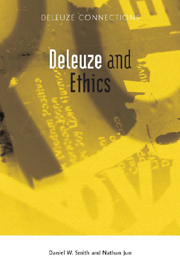Book contents
- Frontmatter
- Contents
- Acknowledgments
- Introduction
- 1 Whistle While You Work: Deleuze and the Spirit of Capitalism
- 2 The Ethics of the Event: Deleuze and Ethics without Aρχή
- 3 While Remaining on the Shore: Ethics in Deleuze's Encounter with Antonin Artaud
- 4 Responsive Becoming: Ethics between Deleuze and Feminism
- 5 Deleuze, Values, and Normativity
- 6 Ethics and the World without Others
- 7 Deleuze and the Question of Desire: Towards an Immanent Theory of Ethics
- 8 “Existing Not as a Subject But as a Work of Art”: The Task of Ethics or Aesthetics?
- 9 Deleuze, Ethics, Ethology, and Art
- 10 Never Too Late? On the Implications of Deleuze's Work on Death for a Deleuzian Moral Philosophy
- 11 Ethics between Particularity and Universality
- Notes on Contributors
- Index
11 - Ethics between Particularity and Universality
Published online by Cambridge University Press: 12 September 2012
- Frontmatter
- Contents
- Acknowledgments
- Introduction
- 1 Whistle While You Work: Deleuze and the Spirit of Capitalism
- 2 The Ethics of the Event: Deleuze and Ethics without Aρχή
- 3 While Remaining on the Shore: Ethics in Deleuze's Encounter with Antonin Artaud
- 4 Responsive Becoming: Ethics between Deleuze and Feminism
- 5 Deleuze, Values, and Normativity
- 6 Ethics and the World without Others
- 7 Deleuze and the Question of Desire: Towards an Immanent Theory of Ethics
- 8 “Existing Not as a Subject But as a Work of Art”: The Task of Ethics or Aesthetics?
- 9 Deleuze, Ethics, Ethology, and Art
- 10 Never Too Late? On the Implications of Deleuze's Work on Death for a Deleuzian Moral Philosophy
- 11 Ethics between Particularity and Universality
- Notes on Contributors
- Index
Summary
Deleuze and Badiou as Contemporaries
Deleuze and Badiou are exceptional figures in the field of contemporary philosophy. They both created influential patterns of thinking which encompass not only philosophy, but also art, science, politics, and ethics. Both Deleuze and Badiou struggle with such concepts as singularity, the multiple/multiplicity, the Real, and the event. But the meanings they assign to these concepts are absolutely different: for Badiou even the idea of the multiple is grounded in the metaphysics of the One; Deleuze, by contrast, replaces the very idea of the One with the idea of multiplicity. The same antagonism between Deleuze and Badiou can be discerned in the ethical-political field: Badiou claims that the way out of the deadlock of neoliberal democracy is a militant universalism; Deleuze, by contrast, suggests that the proper ethical-political approach is that of becoming-minoritarian. In other words, even though they operate with similar philosophical vocabulary and reflect similar ethical-political themes, Deleuze and Badiou are on different sides of contemporary philosophical debates. As Éric Alliez points out:
Deleuze and Badiou constitute the extreme polarities, not only of the contemporary domain of French philosophy, but perhaps of the real of thought as such – to the extent that thought, in accordance with the plurality of all its modalities, has no other choice today than to counter the pseudodemocracy of Empire with a materialist necessity that can no longer be elaborated except in terms of singularities and multiplicities. These are notions that our two philosophers entrust with absolutely antagonistic missions, renegotiating the theoretical and practical sense of the very idea of materialism.
(Alliez 2006: 151–2)- Type
- Chapter
- Information
- Deleuze and Ethics , pp. 188 - 206Publisher: Edinburgh University PressPrint publication year: 2011

